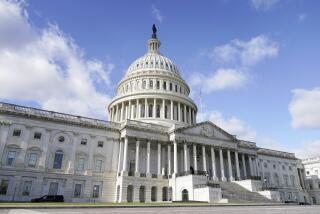Returning lawmakers get off to slow start
At least they had a quorum.
After a monthlong summer break, though, the 154 Iraqi lawmakers who reconvened Tuesday for a fall session showed few signs of urgency to tackle legislation that could help determine the future of the U.S. troop presence in their country.
A day after President Bush made an unannounced visit to Iraq, the latest by U.S. officials pressing Prime Minister Nouri Maliki to hasten political progress, none of the bills seen as crucial to driving national reconciliation came up for discussion.
One lawmaker suggested, half jokingly, that the red curtains in the chamber be replaced with a more calming hue to keep tempers from flaring.
At least one other legislator said he was insulted that Bush had bypassed the capital Monday and limited his visit to a U.S. air base in Anbar province.
“I want to mention my reservation and abhorrence as the meeting was held in an American base in a country having sovereignty,” said Abdul Kareem Enizi, a member of Maliki’s Islamic Dawa Party. Maliki, President Jalal Talabani and his two vice presidents flew to see Bush in Anbar, where a decision by Sunni Muslim tribal sheiks to stop supporting Sunni insurgents has greatly reduced violence.
U.S. military and political leaders are expected to focus on Anbar’s improved security next week when they present a report to Congress assessing the effect of the troop buildup in Iraq. Bush, who is facing demands from some members of Congress to begin withdrawing troops, had hoped that before the report was presented, lawmakers here would have passed some major bills aimed at stabilizing the country. They include legislation to manage the country’s oil revenue and to permit members of former dictator Saddam Hussein’s Baath Party to return to government jobs and receive federal pensions.
The tone of the 90-minute session Tuesday suggested that passage of such bills was not imminent.
The meeting began with a roll call of the 275-member body. High absenteeism is not unusual at parliament sessions, and has been cited frequently by critics as a cause of slow political progress.
The parliament speaker, Mahmoud Mashadani, spoke first, reminding lawmakers of the importance of carrying out their duties “in a way which serves the Iraqis and maintains their dignity, sovereignty, and the future of their generations.”
Then, legislators began to bicker over who was responsible for killings that had occurred during their break. Tempers flared at mention of clashes during a Shiite religious festival last week in the Shiite Muslim holy city of Karbala, which left more than 50 people dead.
The violence pitted members of radical Shiite cleric Muqtada Sadr’s Mahdi Army against those of the Badr Organization, both of which vie to control the oil-rich Shiite south. Leaders of both armed groups deny that they were at fault.
Ahmed Sadawi, a lawmaker with the parliamentary bloc loyal to Sadr, said the violence was a plan to massacre Sadr followers and demanded an investigation.
“Even if it reaches the prime minister himself, we must summon him in front of the council and vote for no-confidence against him, because he is not actually qualified to preserve the constitution and Iraqis!” he said.
Sunni lawmaker Maysoon Damluji interjected that the country still was awaiting the outcome of investigations of other deadly incidents, including the bombing of the parliament building in April in which a Sunni legislator was killed.
Another Sadr follower, Nassar Rubaie, returned to the Karbala clashes, saying that the fact that the pilgrimage was not shown live on TV proved the violence had been planned.
Enizi leaped to Maliki’s defense, saying that the prime minister’s visit to Karbala the day after the clashes had helped keep the violence from spreading.
With the floor firmly in hand, Enizi turned the discussion to the withdrawal Monday of British forces from the center of Basra, in southern Iraq. Enizi called the drawdown a “constructive and positive step” and said he hoped it would persuade the U.S. to withdraw forces from major cities and eventually from the country. He went on to register his anger over Bush’s visit to Anbar instead of Baghdad.
Mehdi Hafidh, an independent, said the government and prime minister owed lawmakers an explanation of what they had done to resolve the country’s problems since parliament recessed at the end of July.
“We have massacres here and there!” he said. “We have cholera! We have displaced people . . . no services, no security, unemployment.”
Lawmakers unanimously approved calling Maliki before the legislature. Mashadani said he would talk to the prime minister to arrange a suitable date.
--
More to Read
Start your day right
Sign up for Essential California for news, features and recommendations from the L.A. Times and beyond in your inbox six days a week.
You may occasionally receive promotional content from the Los Angeles Times.







